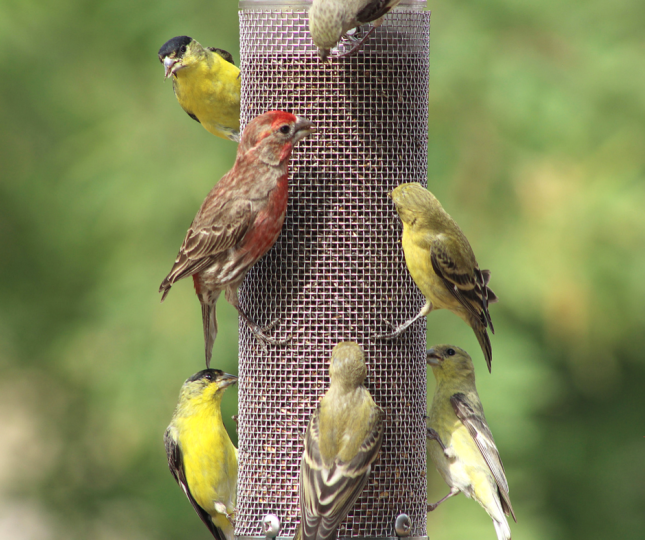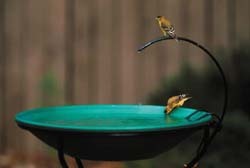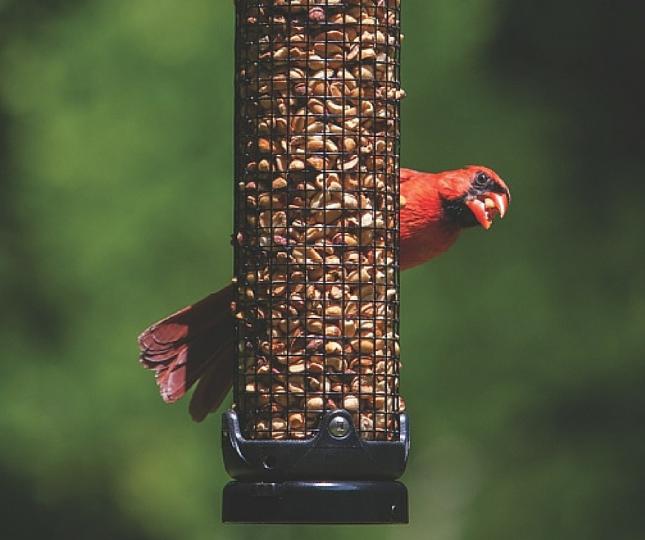Promoting Bird Health In The Backyard

When we spend time watching the birds in our backyards, we are likely to occasionally encounter a sluggish, sick or dead bird. Disease is one of the many natural processes affecting wild species. As birds age, they become more susceptible to a number of diseases that are common in the avian community. But when sick birds show up at feeders, other birds can get sick as a consequence so it's very important that we are feeding the birds in such a way that we aren't exposing them to the dangers of disease and predators. Follow the precautions listed here, and you can continue to enjoy feeding healthy wild birds and feel confident that you are hosting the birds in your backyard responsibly by providing the safest backyard environment for them.
If You Encounter Sick Or Dead Birds
- First, find out if pesticides, herbicides or other chemicals have been used in the yard or in a neighbor's yard.
- Next, find out if any cats have been seen stalking in or around the yard.
- If it looks like the cause of the problem could be disease, take down the feeders the sick birds have been frequenting for a few days to disperse the flock. It may not be necessary to take down all your feeders. (ie. if you are only seeing sick or dead pine siskins or house finches, remove the finch feeders and continue using hummingbird, peanut, suet and other feeders)
- Clean and sanitize the feeders with a 10% bleach/water solution. (Do this regularly, even when no sick birds are present)
- Thoroughly dry the feeders before filling and rehang them a few days later.
- Monitor the situation and take down the feeders again if necessary.
Other Considerations
- Consider replacing wooden feeders with ones made of plastic or recycled materials for easier cleaning.
- Do not reinstall feeders that allow contact between fecal material and food (such as platform or tray feeders)
- Initially provide food and feeders that will not attract finches (suet, safflower, peanuts, hummingbird feeders, etc.)
- Reinstall finch feeders and food after an additional two weeks if you continue to notice sick finches.
- Use antimicrobial bird feeders such as the WBU EcoClean® feeders.
- Clean feeders and birdbaths with a 10% bleach solution several times a week while you're seeing sick birds. Be sure that feeders are dry before filling them with seed.
Common Avian Diseases
- Avian Flu is a viral infection naturally occurring in wild birds - mainly waterfowl and shorebirds. It can occasionally spread to humans. People who work with poultry, waterfowl and dairy cows are most at risk.
- Salmonellosis is a common disease among some feeder birds, especially pine siskins. The bacteria can be spread when healthy birds eat food contaminated with droppings from infected birds. Sick birds can seem very lethargic.
- Avian Pox are irregular wart-like growths on birds’ legs, feet, and faces. The virus that causes it can be spread by close contact among birds.
- Aspergillosis is caused by a fungus that can live on damp bird food and in moist places. Infected birds develop respiratory problems, such as bronchitis and pneumonia.
- Trichomoniasis is caused by a single-celled organism that produces lesions in the upper digestive tract. In some cases, infected birds become unable to swallow and starve. This disease is common among doves and pigeons all over North America and can be responsible for some deaths in some raptors the prey on doves and pigeons. Transmission primarily takes place when adult doves feed their young, courtship and when raptors prey on infected doves.
Bird Feeding Tips
- Clean bird feeders regularly. Scrub them with water and a brush. Rinse and let them dry before refilling.
- When possible, clean the ground under feeders using a dry rake.
- Move feeding stations to different locations around the yard periodically to avoid build-up of debris on the ground.
- Store bird food in a clean, dry, animal-proof container such as a metal garbage can.
- Offer only fresh, clean seed to the birds. Discard all wet or moldy food.
 Bird Bath Tips
Bird Bath Tips
- Place bird baths in direct sunlight when possible. Ultraviolet rays can kill disease organisms, especially in hot weather.
- Scrub and rinse bird baths daily. Periodically, use a solution of 9 parts water to 1 part bleach to disinfect the bath. Rinse well with clean water. It’s best to let baths air-dry before filling them with water again.
- Provide as much space as possible between the feeders and baths in your yard or viewing area. This helps avoid unnecessary contamination of water by food and bird droppings.
General Tips
- Keep feeders and baths away from large windows to minimize the chances of birds flying into the glass. Window strikes cause a substantial number of bird deaths in backyards each year.
- Offer water in containers that are no deeper than a half inch. Songbirds cannot bathe in deeper water.
- Keep cats indoors at all times. Housecats could be responsible for more deaths of backyard songbirds than diseases contracted at feeders.
- Place feeders and baths in open areas that are within a short flight of cover. Birds will be able to spot predators easily and reach cover quickly.
- Hang or mount feeders and baths out of reach of large mammals.
- If you must ground-feed, offer small amounts that the birds can consume in 10 to 15 minutes. Bird food left on the ground overnight can attract unwanted, often destructive, mammals.
How To Discourage Doves and Pigeons
- Limit or avoid scattering seed or grain on the ground.
- Fill feeders with seed mixes that desert songbirds prefer. This will minimize unwanted seed kick-out to the ground where doves can congregate in large numbers.
- Use ‘dove-resistant’ birdfeeders such as finch feeders, suet feeders, and feeders with barriers that keep out large birds. A wide range of models are available.
- Avoid seed mixes containing milo, cracked corn and other grain fillers which are favorite foods of doves and pigeons.
For help with a bird or animal, visit the Tucson Wildlife Center website or call (520) 290-9453

